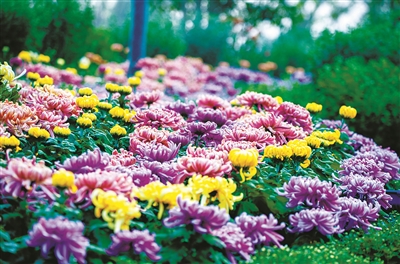
Chrysanthemum exhibition opens at Ningbo botanical garden. [Photo by Tang Yan]
Recently, the 2021 Ningbo Tourism Festival kicked off, with more than 60 local scenic spots, museums, parks, resorts, as well as 30 hotels and B&Bs participating. Citizens can enjoy discounted tickets to tourist attractions and participate in an impressive range of tourism and cultural activities. Come discover Ningbo's amazing autumn destinations with us!
Autumn Floral Sights
This season is the best time of the year to head out into nature. At the Hangzhou Bay National Wetland Park, reed catkins are in bloom, covering an area of 10 km^2 and attracting hordes of visitors.
The 8th Reed Catkins Festival began at the Wetland Park on October 30 and will last throughout November, during which fun activities will take place every weekend, including music performances, poetry readings, painting parties, and role-playing murder mystery games.
As a world-class bird-watching spot, the Hangzhou Bay Park is the only national-level wetland park in Ningbo. In addition to its scenic landscape, the Park is also well-known for its wetland restoration, wetland research, and environmental education efforts.
Rural Fun
Shilin Village is one of the oldest villages in Yuyao. The name "Shilin" means "persimmon grove" in Chinese.
Autumn is the busiest season of the year in Shilin Village. More than seven acres of persimmon orchards in the village bear fruit. The pick-your-own orchards receive flocks of visitors.
The annual output of persimmons here is nearly 200,000 kilograms. Shilin persimmons are smaller than regular varieties, yet exceptionally sweet and brilliantly red. The fruit dangles on branch-tips like adorable small lanterns.
Want to see the dazzling gold and orange of autumn? Fenghua's Tazhulin Village has an ancient ginkgo tree. The tree's age has been confirmed by agriculture and forestry experts to be over 1,500 years old. Known as Ningbo's "King of Trees", this gingko stands testament to the thousand-year history of the village.
In the city, sweet Osmanthus flowers are in bloom everywhere; their scent is Ningbo's unique autumn aroma. Fenghua's Xi'ao Village is famous for its 300-plus Osmanthus trees. The oldest tree is more than 1,000 years old.
Collecting Osmanthus flowers is the activity that many visitors travel to the village for. One person would use a bamboo pole to knock the branches, while the others gather the "rain" of petals that fall from the tree.
Seasonal Delicacies
Not only can Osmanthus flowers be gathered for their fragrance, but they can also serve as a culinary ingredient.
"This year, in addition to the traditional 'Osmanthus shower' and fun activities, there are also Osmanthus foods available for visitors," said Ms. Weng, a tourist.
At Xi'ao Village, visitors can buy wine fermented with Osmanthus flowers, sweet-scented Osmanthus desserts, and other local specialties. Last year, the village's output of Osmanthus flowers exceeded 1,000 kilograms.
Autumn is also the harvest season of Fenghua taro, a variety that is particularly sweet and soft. Many local people associate its taste with the flavor of home.
The main production area of Fenghua taro is Xiaowangmiao Town, where more than 3,000 acres of premium-quality taro are grown.
22 New Tourist Routes
At the Festival, twenty-two newly-curated tourist routes were announced. Each has a different theme, such as "the Yao River's history and culture" or "mountaintop and riverside sceneries". These new routes incorporate the best attractions in and around Ningbo, saving travelers' planning time.
For instance, the "Ninghai hot springs route" strings together the Ninghai Forest Hot Springs Resort, village visits, and nature walks. Other sites of interest along the route include: the hometown of Pan Tianshou, a celebrated traditional Chinese painter; Hehong Village, Ningbo's first "longevity village"; the production farm of Ninghai's coveted Wanghai tea; and more.
By Gou Wen


